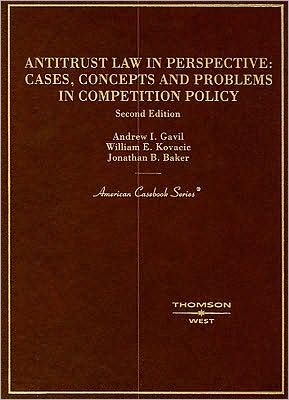Antitrust Law and Economics in a Nutshell
In the "free-for-all" competition of today's marketplace we most assuredly do not trust. Thus were antitrust laws born. This text provides a basic understanding of the legal and economic principles that govern modern antitrust practice. It provides students and practitioners a reliable guide to the antitrust landscape, with increased attention to the expanded role of evidentiary standards and procedural screens in determining litigation outcomes. This edition also treats recent revisions of...
Search in google:
In the "free-for-all" competition of today's marketplace we most assuredly do not trust. Thus were antitrust laws born. This text provides a basic understanding of the legal and economic principles that govern modern antitrust practice. It provides students and practitioners a reliable guide to the antitrust landscape, with increased attention to the expanded role of evidentiary standards and procedural screens in determining litigation outcomes. This edition also treats recent revisions of public enforcement, immunity-related doctrines, and government intervention. The text provides the scope and highlights you need to excel in understanding this field. This will enable you to answer exam questions more quickly and accurately, and enhance your skills as an attorney.
PrefaceTable of CasesCh. IRestraints of Trade at Common Law1AContracts in Restraint of Trade3BMonopoly and Conspiracy10Ch. IIThe Antitrust Statutes15AThe Demand for Regulation15BThe Sherman Act20CThe Clayton and Federal Trade Commission Acts27DInstitutional Implications30Ch. IIIAntitrust Economics (in a Nutshell)42ASome Basic Explanations and Behavioral Assumptions45BBasic Economic Models52CCurrent Developments82Ch. IVThe Monopoly Problem91AMonopoly Power94BMonopolization: The Uses of Monopoly Power120CAttempts to Monopolize153Ch. VHorizontal Restraints: The Evolution of Standards156AThe Economics of Cartels and Transaction Costs157BHorizontal Agreements and the Structure of Legal Rules: The Relationship Between Per Se Rules and Reasonableness Standards165CPrice-Fixing170DMarket Allocations and Production Controls196EBoycotts204Ch. VIHorizontal Restraints: Problems of Proof and Characterization223AEvidence of an Agreement223BProblems of Characterization239Ch. VIIThe Oligopoly Problem266AEconomists and the Oligopoly Problem268BLegal Approaches to the Control of Oligopolies272Ch. VIIIVertical Restraints286ATransaction Cost Economics and Vertical Relationships290BRestrictions on Distribution292CLimits on Supplier Power: Exclusionary Practices326Ch. IXMergers348ATensions in Modern Merger Analysis348BCompetitive Effects Overview353CThe Sherman Act and Mergers Tending to Monopoly360DThe Enactment and Amendment of Section 7 of the Clayton Act363EThe Supreme Court and Merger Analysis Since 1950366FGovernment Merger Guidelines and Premerger Notification394GModern Lower Court Applications402Ch. XPatent and Intellectual Property Issues409AAn Introduction to Patents411BPrice, Territorial, and Use Restrictions415CSettlement and Accumulation424DEnforcement of Patents as an Antitrust Violation429Ch. XIPrice Discrimination and the Robinson-Patman Act431AThe Origin and Enforcement of Section 2 of the Clayton Act432BThe Statute Analyzed435CInjury to Competition438DDefenses444Ch. XIIThe Enforcement and Adjudication Process449APublic Enforcement449BPrivate Enforcement461CFederal Judiciary468Ch. XIIILimits on the Scope of the Antitrust System473AJurisdictional Restrictions473BThe Effect of Government Intervention480Ch. XIVThe Changing Balance in Antitrust497App.: Sherman Act506App.: Clayton Act507App.: Federal Trade Commission Act510Index511







